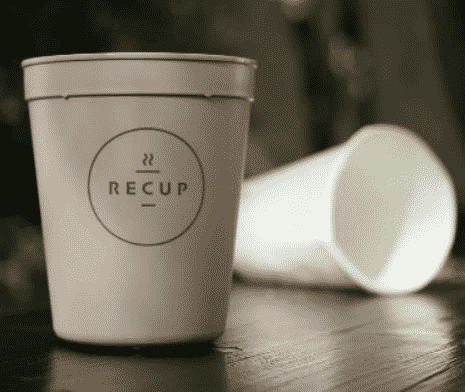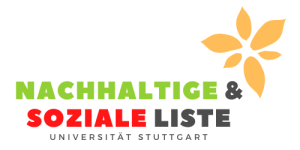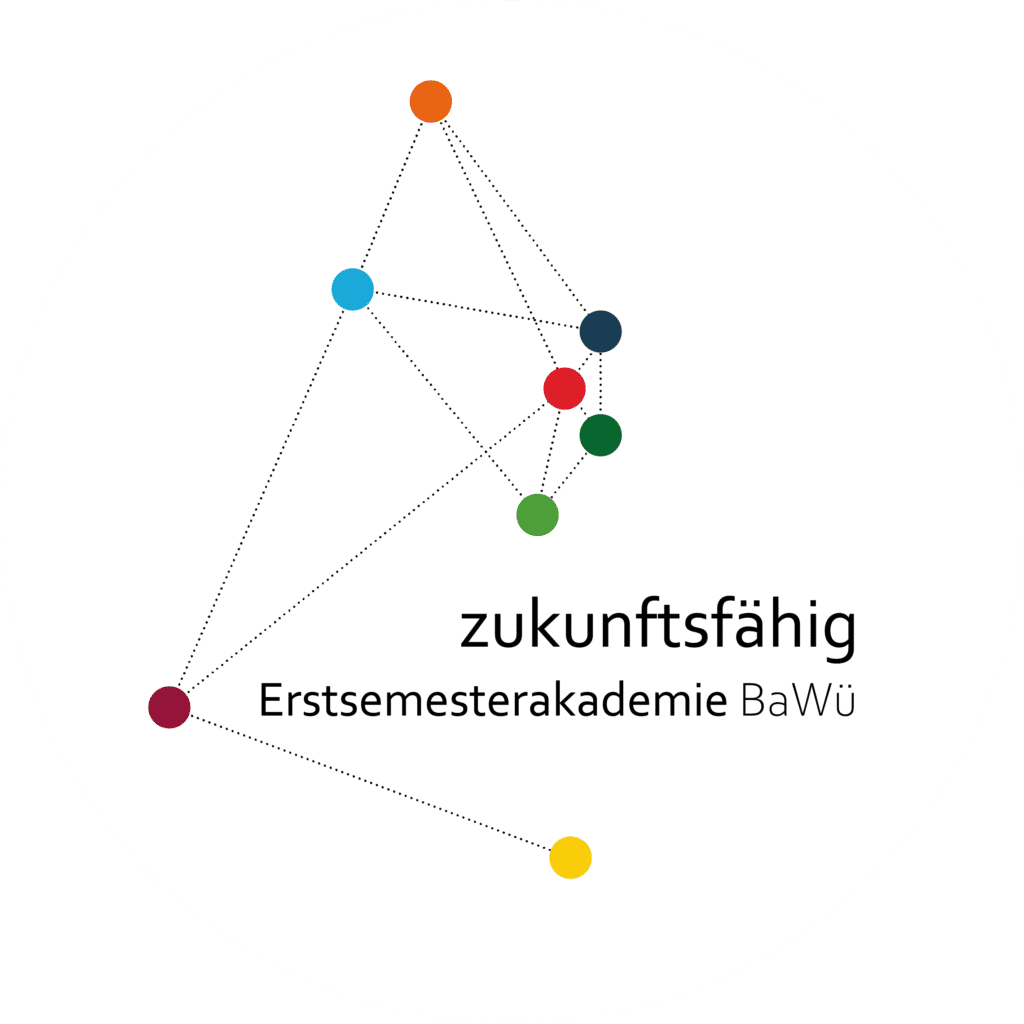Election Program
Status: Summer term 2021
The “Nachhaltige & Soziale Liste ” (engl. Sustainable & Social List) is an association of students who are committed to a sustainable, socially fair, diverse, inclusive, barrier-free, democratic and political University of Stuttgart. We contribute to the shaping of our university through our work in the student parliament, in “stuvus” departments and “stuvus” working groups, and through our involvement in the various sustainable and social university groups. In particular, we advocate for the needs of unheard minorities and future students. We see the university as a political space, because the university is also part of society and must behave as such!
Our Demands and thematic Priorities
Campus as a Meeting Place
As an open educational institution, the university thrives especially on open exchange. We therefore have the vision of a “campus as a meeting place” where students and lecturers can network and come together in an interdisciplinary way.
There is a need for more life on the campuses, with a diverse range of gastronomy, fair share, water dispensers, gardens, events and exhibitions or other places to go out and meet. We see the campuses in Stadtmitte and Vaihingen not only as places to learn and work, but also as lively residential and leisure areas. Of course, this also requires more green and recreational areas and a better cycling infrastructure. Furthermore, this can be combined with the promotion of international art and culture exchange through musical, historical and traditional events!
We very much welcome the fact that a Green Office has recently been established at the University of Stuttgart. This can act as a central contact point where we can collaborate in shaping our campuses of tomorrow. It is still unclear which tasks the Green Office will actually be able to take on – the needs are high and the resources scarce. We therefore demand that the Green Office receives the necessary resources in the long term, i.e. financial means on the one hand, but also premises at central locations at the University of Stuttgart. We also think it is essential that the Green Office becomes a student-driven sustainability office, that students can realize their own ideas for more sustainability at the University of Stuttgart and that they can take on management tasks themselves, and that no strict hierarchies are created. In order for the Green Office at the University of Stuttgart to be a success, it must become an open platform for everyone.
Solidarity & Diversity
Diversity
Every human being is an individual and wants to be treated as such, this includes that no one is discriminated against, regardless of the believes and sexual orientation of the individual. Therefore we, as “Sustainable & Social List”, are against all forms of racism, sexism and other forms of oppression of personal expression and show clear edge against right wing politics. We stand up for cultural, sexual and gender diversity and a plural, democratic exchange of opinions. Since discrimination already exists in one’s choice of words, we advocate a gender-sensitive language throughout the University of Stuttgart and will also support the stuvus department for Equality, Diversity and Social Affairs in its work. Furthermore, it should be the goal of the student representation to reflect the diversity of society in terms of personnel and to involve more female and diverse students. Equal representation should be aimed for. We are also convinced that women* should be promoted more strongly in science.
International
Due to the Corona pandemic, many foreign students cannot enter Germany and have to study online at the university. It is incomprehensible that the state government has not decided to suspend tuition fees for foreign students. We think this behavior is irresponsible and we are working to ensure that students from non-EU countries don’t have to pay tuition fees. These high tuition fees should not be reintroduced even after the pandemic, as they contradict the principles of inclusion and free research.
We also want to work for a better integration of foreign students at the university:
- offer important documents and announcements in English
- higher involvement of “Internationals” in the student parliament
Living
In view of the further increase in rents and the unacceptable situation for students in their search for accommodation, we will work to ensure that the university makes clear demands to federal, state and local politicians for greater promotion of affordable housing. More living space for students should be created and the Studierendenwerk should be relieved by a higher subsidy from state funds.
Corona
The pandemic poses major problems for all of us – both in our studies and in everyday life: some of us have lost their part-time jobs, others have lost their childcare, and yet others are looking after relatives or are involved in neighborhood help or similar activities. Here it is important that the university supports precisely those in this difficult situation by recording lectures and making them available on a long-term basis. Due to the increasing isolation of students, it is also essential that students can network with each other in the digital world. We therefore call for the provision of online platforms for joint Learning and sharing.
In recent semesters, many students fell by the wayside because support from politicians came too late and too lax. We support the students’ catalog of demands “Solidarsemester 2020” (“Solidarity Semester 2020”) and therefore demand solidarity with all students who are particularly disadvantaged by the pandemic in the coming semesters.
Despite Corona, it is important that the university remains a meeting place. We therefore demand that, in compliance with all hygiene regulations, as many presence offerings as possible be responsibly created, especially for first-year students. In addition, as many study rooms as possible should be made available again to students to enable an appropriate learning environment.
Good & Future-oriented Teaching
We are committed to good, future-oriented teaching that focuses on the well-being of society and is increasingly oriented towards the goals of sustainable development. To meet the social and ecological challenges, more interdisciplinary exchange and free space for reflection is needed. We therefore call for a university-wide discourse on how sustainability and reflection can be integrated more strongly into teaching at the University of Stuttgart. To this end, we intend to cooperate with the Prorectorate of Teaching and use the Teaching Day as a platform to introduce the topic.
“Sustainability” is interdisciplinary and should be a topic that is discussed in all degree programs. An introduction should therefore be made at the beginning of the studies in order to take as many students as possible along the path to a sustainable society in the sense of a socio-ecological transformation. Prior to the winter semester 2020/21, the first “Erstsemesterakademie BaWü ‘zukunftsfähig‘” first semester academy was held, organized by students for the new first-year students. We demand a continuation of the First Semester Academy as a fixed offer before the beginning of each winter semester.
Due to the pandemic, digital teaching has gained in importance. For a good & future-oriented teaching, we make the following demands for digital teaching:
- Online recordings and long-term provision of the recordings should always be available to enable single parents or care-workers to study
- Interaction must also be possible and encouraged in online teaching
- The university administration must not rest on the fact that the technology for recordings is currently available in some lecture halls; maintenance of the existing technical equipment must always be guaranteed and appropriate staff must be available.
- Open source software should be more strongly promoted (“Public Money? Public Code!”) and sustainability criteria should be taken more into account in the selection process (independence from corporations, data economy, promotion of the common good, decentralized participation, etc.).
- The tools used at the university and in digital teaching must be privacy-friendly. In particular, we call for a privacy-friendly alternative to Cisco Webex and Microsoft Teams.
- In the name of privacy, we call on the university administration and the individual faculties to change their choice of default search engine and to implement this choice on every newly set up computer.
- After the pandemic, we have to switch back to teaching in attendance – we do not want a pure online teaching in the long run!
Critical & Innovative Research
A university naturally requires innovative research that makes important contributions to shaping the society of tomorrow and critically examines social and ecological implications. As students, we have no direct influence on the scientific orientation of the university, but we can and want to point out problems that should be discussed openly.
The vision of the Universität Stuttgart is “Intelligent systems for a sustainable society”. How such a “sustainable society” can look like should be openly discussed at the university and the role of technological innovations and intelligent systems should be critically reflected upon. Only by involving all members of the university in a holistic process can the vision become reality and have a real, positive impact on society.
Specifically, we call for the university to be funded in order to ensure a broad and critical scientific community. This also includes the abolition of tuition fees for foreign students, so that international exchange during studies is not further harmed but rather promoted. Critical science also includes questioning and reflecting on existing systems and discourse on alternative forms of economy and society. Research should be guided by the 17 Sustainable Development Goals (SDGs); this means that research must always consider the ecological implications and be social and peaceful.
Unfortunately, military research projects still take place at the University of Stuttgart time and again, and manufacturers of armaments (e.g. combat weapons missile systems) are frequently represented at company contact fairs. Therefore, we demand the introduction of a civil clause at the University of Stuttgart, i.e. a voluntary commitment not to allow military research.
In this context, it is also important to reduce the dependence of many research areas on third-party funding through consistent out-funding, and we expect the University of Stuttgart to provide complete transparency regarding third-party funding.
Sustainable & Holistic
A holistic approach to sustainably establishing the University of Stuttgart is still a long way off. There is a lack of transparency, coordination of sustainability efforts and, above all, credibility.
However, the new structural and development plan of the University of Stuttgart (SEPUS 2021-2025) gives hope that the university will finally become aware of its responsibility. The establishment of a Green Office, the introduction of EMAS (environmental management system) by 2025, the goal of climate neutrality by 2035 and the new seventh strategic goal “Active for a sustainable development” are important and necessary steps towards a sustainable University of Stuttgart. We consider the target for climate neutrality to be too unambitious, as it is not sufficient to meet the 1.5 °C target.
Our demands to make the university more sustainable and climate-friendly, divided into the four areas “credibility & transparency”, “mobility”, “resources & energy” and “catering”:
Credibility & transparency
- Taking responsibility for the implementation of the Sustainable Development Goals (SDGs)
- free and open educational events for an ecological and fair future
- open discourse on “sustainability”
- annual sustainability reports
Resources & energy
- development of a strategy for waste avoidance and waste separation on the campuses, in the cafeterias and dormitories
- introduction of paper garbage cans in the offices of the University of Stuttgart
- planting of university buildings – for green instead of gray facades
- photovoltaic systems on all university roofs
implementation of a holistic energy concept to achieve climate neutrality. In the long term, the energy generated from the HKW in Vaihingen should be replaced by renewable energies.
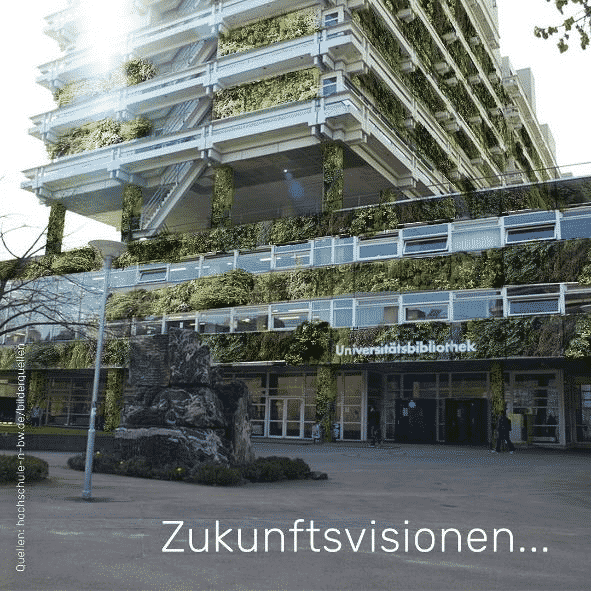
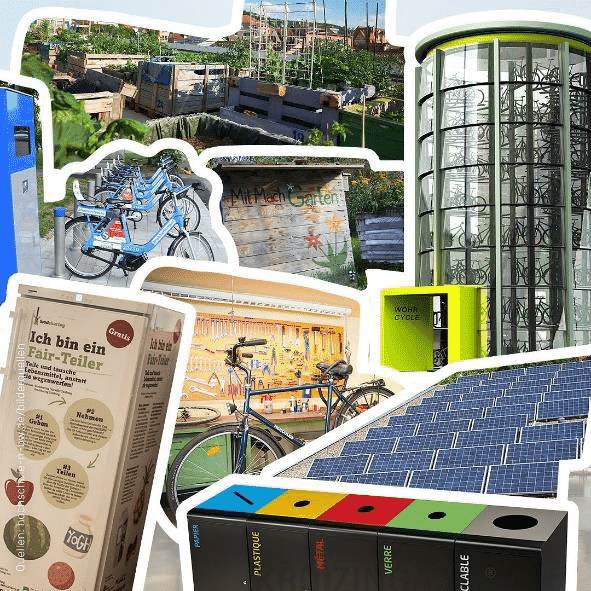
Mobility
- better bicycle infrastructure: safe and fast cycle paths, workshops and repair stations, bicycle boxes
- assumption of the costs of the RegioRadStuttgart stations on the university grounds in Vaihingen as well as in the city center by the university
- more S-Bahn lines to the university
- good connection to the Vaihingen university campus, even during tunnel closures and at night during the week
- 365€-year tickets for the VVS network; in the medium term as a state-wide ticket in Baden-Württemberg
- real sustainable mobility instead of a parking garage on the campus edge (keyword “MobiLab”)
Catering
- better vegan offer in the refectories and especially in the cafeterias
- daily, reasonably priced vegan main course in the refectories
- increase of transparency regarding sustainability (CO2-eq-balancing) & health (Nutri-Score)
- introduction of water dispensers, at least in all new buildings
- We welcome food trucks if they offer sustainable food and dispose of leftovers appropriately.
more possibilities to heat and/or consume food brought in by the guests
Democratic & Political
We want to advocate more student participation in university committees. Transparency of decisions in university committees and student representative bodies are a basic requirement for a functioning democratic system. Unfortunately, this is not always the case.
Furthermore, we call for a general political mandate for the constitutional student bodies. The constructed separation between general policy and university policy is both unnecessary and problematic. As students, we are an important part of society and should therefore be allowed to express ourselves politically. Especially in the context of the Corona pandemic it became clear again that we students do not have the possibility to represent our interests towards politics.
What did we achieve already?
Since the summer semester 2018, we have been working as the “Sustainable & Social List” for sustainability and social community life at the University of Stuttgart. Among other things, we can point to the following successes to date:
- Creation of the stuvus-Department for Sustainability
- Introduction and financing of RegioRad stations
- Change of the semester ticket to flexible booking
- Mitigation of increases in semester fees by the Studierendenwerk
- Introduction of a Green Office at the University of Stuttgart
- Establishment of a vegan main course in the refectories
- Introduction of plant-based milk alternative in coffee machines
- Participation in the introduction of the Recup deposit system
- Position paper on the climate crises (German only), demands and stuvus’ objectives
- open letter for sustainable videoconferencing tools (German only) at the University of Stuttgart and statement on data protection at universities (German only) in Baden-Württemberg.
